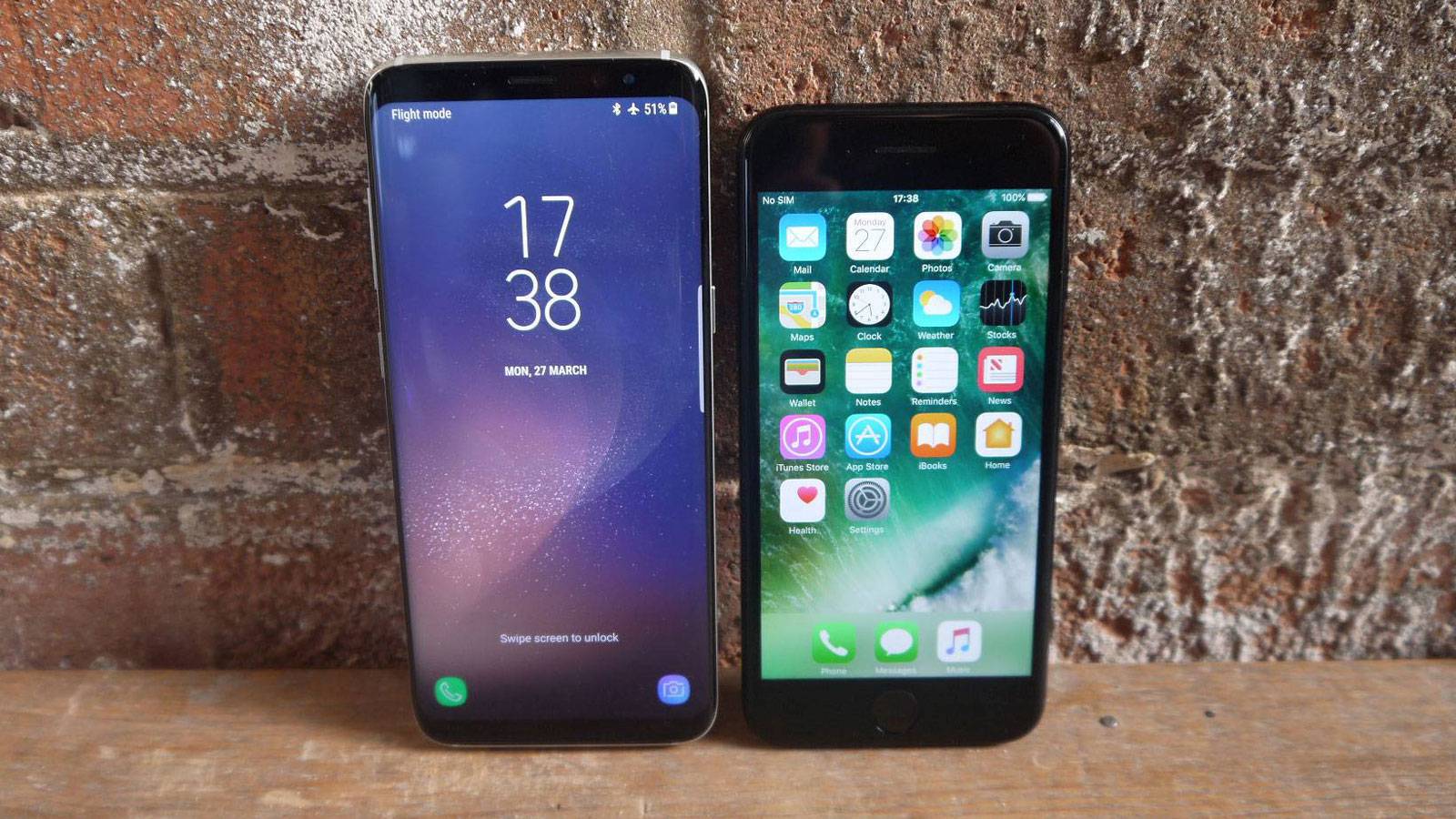Galaxy S8 is here: Should you still wait for iPhone 8?

As expected, the smartphone industry is going all gaga over Galaxy S8’s launch. Now it would be interesting to see how Apple plans its move for the upcoming flagship—iPhone 8. Looking at the rise in growth and innovation on the Galaxy S series smartphones, Apple must note that not every Samsung phone is going to blast for their good.
Read: What’s new in Samsung Galaxy S8?
While iPhone 7 is still the hottest selling flagship smartphone in the market, it is still called uninspiring by many. Despite of several changes, Apple’s iPhone 7 was not very different from the iPhone 6s. In contrast, Samsung has shown some impressive upgrades in its smartphones in recent years. For instance, the camera on Galaxy S6 and S7, IP68 certification, curved edge display, wireless charging, and a lot more.
This time around, Samsung has again did something remarkable with the Galaxy S8. Be it the design, camera, display or the hardware. But still, there are some areas that did not satisfy the demanding human nature of mine.
Samsung has always preferred an early launch unlike Apple which announces its Flagship in the Q3 every year. This turns out to be both positive and negative for Samsung. While it gets an early demand from the consumers, it also allows the competitor to prepare their device after a long term analysis of the Galaxy S smartphone. Joining Apple, Google is also adding some heat to the competition with its Pixel phones from last year.
Honestly speaking, there is no comparison between an iOS device and an Android device. But when you go out to buy a premium flagship smartphone, Samsung and Apple are the top contenders that make it to the list of best options. When you shed a huge amount for these smartphones, it makes sense to consider each and every aspect before you make a purchase.
It often happens when users regret buying that smartphone and wish they waited for the iPhone. Samsung Galaxy S8 is one of those smartphones that has all the qualities to take away that regret.
Sign up for breaking news, reviews, opinion, top tech deals, and more.
So if you don't want to wait till the last moment here are some points that might help you decide if you should wait for the iPhone 8 or not.
Design
Samsung Galaxy S7 Edge is said to be the most beautiful looking smartphone from 2016, and it’s not an easy job to take it to the next level from that standard. But Samsung has done it in style. On the other hand, Apple has used the same iPhone 6 like design on the iPhone 7, which did not go down well with critics blaming the lack of innovation. Adding up the Matte Black and Jet Black variants was indeed a better move.
So if you consider the design, I feel the Galaxy S8 has a design that is no less than any other smartphone that has surfaced so far. Even if the iPhone 8 comes with something fresh, it’s hardly possible for it to make the Galaxy S8 look dull in front of it.
Display
One of the most beautiful feature on the Galaxy S8 is its display. If we look at the past, the Galaxy S6 and S7 Edge’s curved display was the biggest stand-out factor for the love it received. This time again, the Super AMOLED Infinity display from Samsung stole the show right away. It gives an immersive experience which is nothing less than a beauty.
So if you are worried about display, the Galaxy S8 won’t disappoint you. Even if Apple cuts down the bezels to increase the screen-to-body ratio, it won’t be that easy to beat S8’s Infinity display.
Camera
The camera on Galaxy S8 is closely similar to the one on Galaxy S7, which is also the best rated camera in 2017. It comes with revolutionary dual-pixel autofocus and amazing low light photography prowess. There are some upgrades done in the camera department this time as well, but nothing major.
While many flagships including the iPhone 7 Plus have moved to a dual-camera module, Samsung has decided to stick to a single camera. Why not? When a single camera is doing the job that dual-cameras fail at.
However, if you have a thing for dual-cameras and loved the one on iPhone 7 Plus, then you should certainly wait for the next iPhone.
Performance
Samsung Galaxy S8 comes with Qualcomm’s Snapdragon 835, which is the highest rated SoC from the makers this year. It will be the sole competitor to Apple’s upcoming chip on the next iPhone.
Software
The Galaxy S8 is an Android based device and iPhones run on iOS. If you love tons of customisation options on your smartphone, then the Galaxy S8 can come in handy for you. The best part is that Samsung has also streamlined the proprietary Samsung skin this time. The interface looks much cleaner and lighter this time.
On the other hand, iOS has some restrictions but it is has a totally different feel of it. It is said if for once you have used an iOS device, its not easy to move back to Android. iOS is much smoother and clutter-free when compared to Android.
In terms of software features, the Galaxy S devices have always had an upper hand when compared to iPhones.
Also Read: 5 reasons why you should buy the Samsung Galaxy S8
Why should you wait for the iPhone 8?
There is almost nothing that the Galaxy S8 does not offer. It has Bixby to take on Siri, it is IP68 certified, pressure sensitive invisible home button, great camera, wireless charging, an IRIS scanner, Snapdragon 835 for breakthrough performance, VR support, the new Dex feature, and a lot more.
It’s funny but we cannot ignore the fact that Apple’s tenth year anniversary is one reason why we suspect something special coming from the company. How special is that ‘something special’ is still a mystery.
If you are used to iOS, want a dual-camera or the 3D Touch, then you must wait for the iPhone 8. Otherwise, the Galaxy S8 has not given us enough reasons to ignore it for the upcoming iPhone.

Sudhanshu Singh have been working in tech journalism as a reporter, writer, editor, and reviewer for over 5 years. He has reviewed hundreds of products ranging across categories and have also written opinions, guides, feature articles, news, and analysis. Ditching the norm of armchair journalism in tech media, Sudhanshu dug deep into how emerging products and services affect actual users, and what marks they leave on our cultural landscape.
His areas of expertise along with writing and editing include content strategy, daily operations, product and team management.